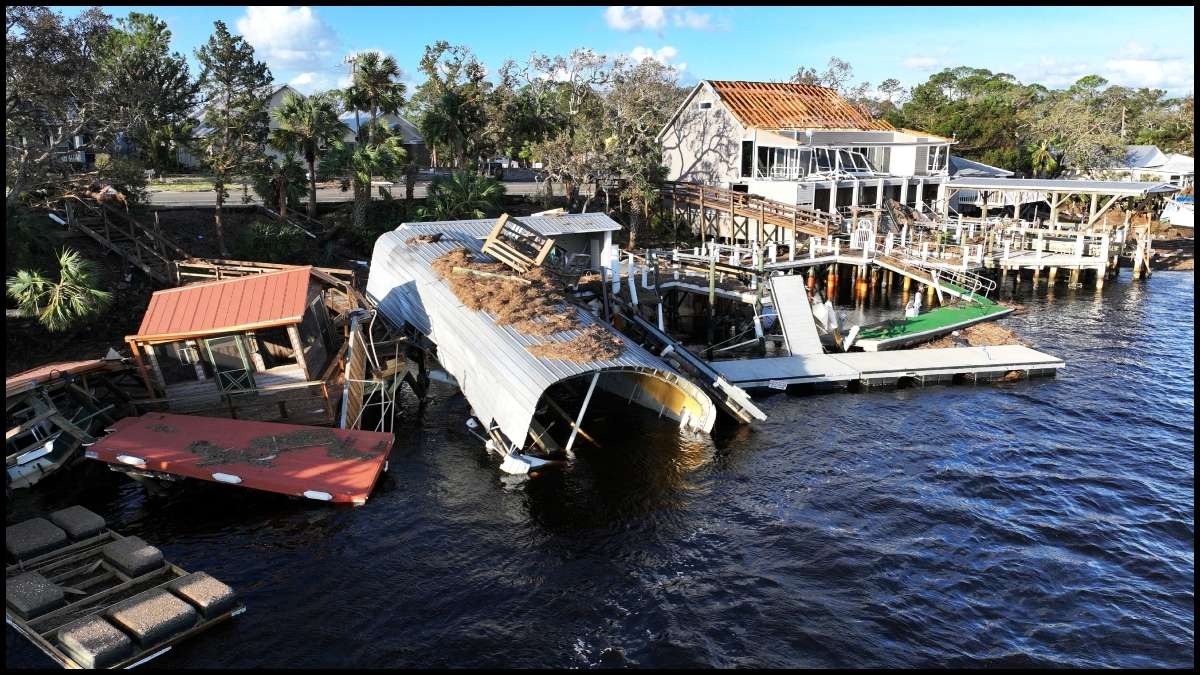
International: Hurricane Helene, a tropical depression that hit Florida this week, brought widespread destruction on Friday in several parts of the country's Southeast, killing at least 44 people, inundating entire neighbourhoods, triggering mudslides and leaving more than 3.5 million households and businesses without power. Rescue crews launched desperate missions to save people from the floodwaters as the storm left a trail of destruction.
Among those killed were three firefighters, a woman and her one-month-old twins, and an 89-year-old woman whose house was struck by a falling tree. The deaths occurred across Florida, Georgia, North Carolina, South Carolina and Virginia, according to an Associated Press tally. Moody's Analytics said it expects $15 billion to $26 billion in property damage.
Earlier, Helene had intensified into a Category 4 storm as it moved towards Florida's northwest coast, bringing with it the potential for catastrophic damage, as per forecasters. It was expected to cause "nightmare" storm surges, destructive winds, and heavy rainfall across much of the southeastern United States, they said. Helene is the eighth named storm of the Atlantic hurricane season, which began June 1.
Hurricane Helene wreaks havoc in US
Helene hit Florida's Big Bend region as a powerful Category 4 hurricane on Thursday night, packing 140 mph (225 kph) winds, leaving behind a chaotic landscape of overturned boats in harbours, felled trees, submerged cars and flooded streets. By early Friday afternoon, the storm had been downgraded to a tropical depression with maximum sustained winds of 35 mph (55 kph), the National Hurricane Center said.
Helene's heavy rains were still producing catastrophic flooding in many areas, with police and firefighters carrying out thousands of water rescues throughout the affected states. More than 50 people were rescued from the roof of a hospital in Unicoi County, Tennessee, about 120 miles (200 km) northeast of Knoxville, state officials said, after floodwaters swamped the rural community.
Soon after it crossed over land, Helene weakened to a tropical storm and later a post-tropical cyclone. Forecasters said it continued to produce catastrophic flooding, and some areas received more than a foot of rain. They warned that the flooding in North Carolina that could be worse than anything seen in the past century.
Rescue operations underway, dam failure feared
Emergency crews in boats and helicopters have begun conducting rescues. Rising waters from the Nolichucky River were preventing ambulances and emergency vehicles from evacuating patients and others there, according to the Unicoi County Emergency Management Agency. In Tennessee, Rob Mathis, the mayor of Cocke County, ordered the evacuation of downtown Newport because of a potential dam failure nearby.
The Tennessee Emergency Management Agency wrote on social media that the Walters dam, which is located just across state lines in North Carolina, had not failed. In western North Carolina, Rutherford County emergency officials warned residents near the Lake Lure Dam to immediately evacuate to higher ground, saying "Dam failure imminent." However, the county emergency officials later said that engineers had evaluated the dam "and determined it is no longer at imminent risk of failure."
Atlanta received a record 28.24 centimetres of rain in 48 hours, the most the city has seen in a two-day period since record-keeping began in 1878, according to Georgia's Office of the State Climatologist. Some neighbourhoods were so badly flooded that only car roofs could be seen poking above the water. More deaths were reported in Georgia and the Carolinas.
In coastal Steinhatchee located in Florida, a storm surge - the wall of seawater pushed ashore by winds - of eight to 10 feet moved mobile homes, the National Weather Service said. The city of Tampa posted on X that emergency personnel had completed 78 water rescues of residents and that many roads were impassable because of flooding.
About Hurricane Helene
Helene is forecast to be one of the largest storms in breadth in years to hit the region, said Colorado State University hurricane researcher Phil Klotzbach. He said since 1988, only three Gulf hurricanes were bigger than Helene's predicted size: 2017's Irma, 2005's Wilma and 1995's Opal. Areas 160 kilometres north of the Georgia-Florida line can expect hurricane conditions. More than half of Georgia's public school districts and several universities canceled classes ahead of landfall.
The state has opened its parks to evacuees, and their pets, including horses. And overnight curfews were imposed in many cities and counties in south Georgia, including Albany, Valdosta and Thomasville. For Atlanta, Helene could be the worst strike on a major Southern inland city in 35 years, said University of Georgia meteorology professor Marshall Shepherd.
--Advertisement--

 Desk
Desk Share
Share






